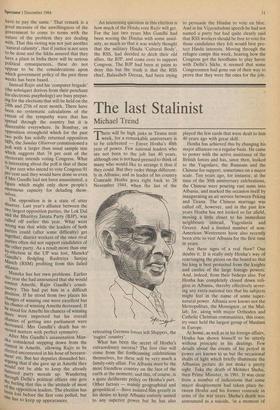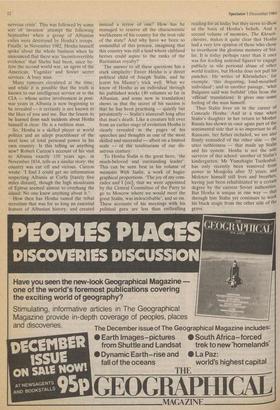The last Stalinist
Michael Trend
There will be high jinks in Tirana next week, for a remarkable anniversary is to be celebrated — Enver Hoxha's 40th year of power. Few national leaders who are not born to the job last 40 years, although one is not hard-pressed to think of many who would like to arrange it thus if they could. But they order things different- ly in Albania; and as leader of his country Comrade Hoxha goes right back to 28 November 1944, when the last of the
retreating German forces left Shqiperi, the `eagles' country'.
What has been the secret of Hoxha's extraordinary success? The first clue will come from the forthcoming celebrations themselves, for these will be very much a family-only affair. For Albania must be the most friendless country on the face of the earth at the moment; and this, of course, is a quite deliberate policy on Hoxha's part. Other factors — mainly geographical and geopolitical — have assisted him greatly in his desire to keep Albania entirely untied to any superior power but he has also played the few cards that were dealt to him 40 years ago with great skill.
Hoxha has achieved this by changing his major alliances on a regular basis. He came to power with the active assistance of the British forces and has, since then, looked to the Yugoslays, the Russians and the Chinese for support, sometimes on a major scale. Ten years ago, for instance, at the time of the 30th anniversary celebrations, the Chinese were pouring vast sums into Albania, and marked the occasion itself by inaugurating an air service between Peking and Tirana. The Chinese marriage was called off, however, and in the past few years Hoxha has not looked so far afield, moving a little closer to his immediate neighbours instead, Yugoslavia and Greece. And a limited number of non- American Westerners have also recently been able to visit Albania for the first time in years.
Are these signs of a real thaw? One doubts it. It is really only Hoxha's way of rearranging the pieces on the board so that his king is best protected from the knights and castles of the large foreign powers. And, indeed, from their bishops also. For Hoxha has completely closed down reli- gion in Albania, thereby effectively sever- ing any extra-national ties that his subjects might feel in the name of some super- natural power. Albania now knows not the Metropolitan, the Monsignor, or the Mul- lah; for, along with major Orthodox and Catholic Christian communities, this coun- try once held the largest group of Muslims in Europe.
At home, as well as in his foreign affairs, Hoxha has shown himself to be utterly without principle in his dealings. Few details about the events of his period in power are known to us but the occasional shafts of light which briefly illuminate the Albanian picture do not make a pretty sight. Take the death of Mehmet Shehu, then Prime Minister, in 1981. It was clear from a number of indications that some major disagreement had taken place be- tween Hoxha and his former comrade in arms of the war years. Shehu's death was announced as a suicide, 'in a moment of nervous crisis'. This was followed by some sort of 'invasion' attempt the following September when a group of Albanian exiles were destroyed by Hoxha's troops. Finally, in November 1982, Hoxha himself spoke about the whole business when he announced that there was 'incontrovertible evidence' that Shehu had been, since be- fore the second world war, an agent of the American, Yugoslav and Soviet secret services. A busy man.
Many rumours circulated at the time; and while it is possible that the truth is known to our intelligence service or to the CIA — whose active involvement in post- war years in Albania is now beginning to be revealed — it certainly is not known to the likes of you and me. But the lesson to be learned from such incidents about Hoxha himself is clear: He is a ruthless man.
So, Hoxha is a skilled player at world politics and an adept practitioner of the steel laws of total personal power in his own country. Is this telling us anything new? Robert Curzon's account of his visit to Albania exactly 150 years ago, in November 1834, tells us a similar story: the country was cut off and vicious. Curzon wrote: 'I find I could get no information respecting Albania at Corfu [barely five miles distant], though the high mountains of Epirus seemed almost to overhang the island. No one knew anything about it.'
How then has Hoxha tamed the tribal terrorism that was for so long an essential feature of Albanian history, and created instead a terror of one? How has he managed to reserve all the characteristic warlikeness of his country for the iron rule of the state? And why have we been so unmindful of this process, imagining that this country was still a land where clubland heroes could aspire to the ranks of the Ruritanian royalty?
The answer to all these questions has a stark simplicity: Enver Hoxha is a direct political child of Joseph Stalin, and he learnt his Master's trick well. What we know of Hoxha as an individual through his published works (40 volumes so far in Albanian, and some now in translation) shows us that the secret of his success is that he has been practising — quietly but persistently — Stalin's statecraft long after that man's death. Like a creature left over from an earlier stage of evolution Hoxha is clearly revealed in the pages of his speeches and thoughts as one of the most skilled and successful — albeit on a limited scale — of the totalitarians of our dis- astrous century.
To Hoxha Stalin is the great hero, 'the much-beloved and outstanding leader'. This can be seen best in his volume of memoirs With Stalin, a work of hagio- graphical proportions. 'The joy of my com- rades and I [sic], that we were appointed by the Central Committee of the Party to go to Moscow where we would meet the great Stalin, was indescribable', and so on. These accounts of his meetings with his political guru are less than enthralling reading for us today but they serve to show us the basis of Hoxha's beliefs. And a second volume of memoirs, The Khrush- chevites, makes it quite clear that Hoxha had a very low opinion of those who chose to overthrow the glorious memory of Sta- lin. It is today perhaps rarer than it once was for leading national figures to engage publicly in vile personal abuse of other world leaders, but Hoxha does not pull his punches. He writes of Khrushchev, for example, 'this disgusting, loud-mouthed individual'; and in another passage, 'what Bulganin said was bullshit' (this from the 'official' translation). It gives one some feeling of the man himself.
Thus Stalin lives on in the career of Comrade Hoxha. And at a time when Stalin's daughter in her return to Mother Russia has shown us once again part of the sentimental side that is so important to all Russians, her father included, we are also firmly reminded of the other side — the utter ruthlesness — that made up Stalin and his system. Hoxha is not the sole survivor of this school: another of Stalin's kindergarten, Mr Yumzhagin Tsedenbal, has only recently been removed from power in Mongolia after 32 years; and Molotov himself still lives and breathes, having just been rehabilitated to a certain degree by the current Soviet authorities. But Hoxha is unique in one way — that through him Stalin yet continues to work his black magic from the other side of the grave.























































 Previous page
Previous page